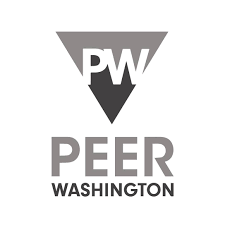Enhancing Health Outcomes for Justice-Involved People in South King County

Grantee: Peer Washington
Timeframe: July 2023 – June 2025 | Amount: $598,274.64
- Year 1: July 2023 – June 2024. Amount: $198,764.64
- Year 2: July 2024 – June 2025. Amount: $199,686.00
- Year 3: July 2025 – June 2025. Amount: $199,824.00
Behavioral health needs have sharply increased in King County, with South King County experiencing some of the highest overdose death rates in the region. These challenges disproportionately affect BIPOC, LGBTQ+, and low-income populations, who are also overrepresented in the criminal justice system. Recognizing the need for alternatives to traditional justice responses, Peer Washington launched the South King County Municipal Court Peer Integration Project (SKCMCPIP) in 2022 in partnership with the Federal Way, Des Moines, and Renton municipal courts and SCORE Jail.
The project embeds Peer Support Specialists (PSSs) within court systems to support individuals at key justice system intercept points. PSSs provide emotional support, conduct needs assessments, connect individuals to behavioral health and social services, and offer ongoing peer support through Peer Kent.
Now entering Year 3, Peer Washington will focus on:
Sustaining and expanding services to new municipal courts (Issaquah, Shoreline, SeaTac);
Strengthening data collection by expanding surveys and continuing GPRA tracking;
Maintaining SCORE Jail engagement with 3–5 weekly visits and expanded post-release support;
Advancing advocacy through presentations, funding outreach, and legislative engagement;
Planning for leadership transition with the upcoming retirement of Federal Way’s presiding judge to ensure continued court collaboration.
ABOUT OUR GRANTEE
Peer Washington
Peer WA’s mission is to cultivate powerful, healthy lives by providing peer emotional support and development services to those impacted by addiction, mental health issues, and/or HIV/AIDS.